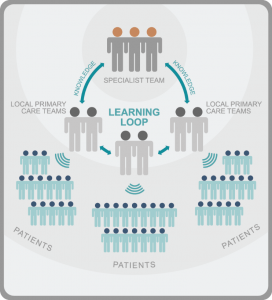Dementia ECHO is no longer running in its current form. However, in response to Community needs we will be coordinating a new ECHO program to be launched soon.

The prevalence of dementia in Aboriginal and Torres Strait Islander communities is one of the highest in the world, with rates 3 to 5 times higher than their non-Indigenous counterparts. Although it is known that adequate support for people living with dementia can minimise impact on the individual and their community; poor access to health services is an ongoing issue for Aboriginal and Torres Strait Islander peoples living in regional, rural and remote communities.
- Rates of dementia in Aboriginal and/or Torres Strait Islander people living in remote areas is one of the highest in the world
- Aboriginal and Torres Strait Islander people develop Dementia at a younger age (from 45 years)
- Rates of diagnosed dementia in the Torres Strait 11.7% compared with 2.4% in non-Indigenous populations
The National Aboriginal and Torres Strait Islander Dementia Advisory Group in 2015 found four main issues which need to be addressed:
- Education and awareness of dementia in Aboriginal and Torres Strait Islander communities
- Risk reduction strategies for dementia in Aboriginal and Torres Strait Islander communities.
- Accessible, culturally appropriate, affordable, well located and responsive dementia and aged care services and supports in the community for Aboriginal and Torres Strait Islander peoples with dementia – from diagnosis to end of life care.
- High quality and culturally appropriate residential aged care options for Aboriginal and Torres Strait Islander peoples with dementia.
Despite government attempts to address access issues, critical health workforce shortages continue to lead to inequitable access to appropriate and culturally safe health care for the communities. Place-based solutions comprised of local workforce upskilling meet demands to facilitate community ownership of health care and culturally safe practices. The Centre for Online Health (COH) at The University of Queensland (UQ) was successful in obtaining a grant (Indigenous Australians Health Programme Emerging Priorities Grant – Department of Health, Commonwealth of Australia) to work with Aboriginal Medical Services (AMS) and Aboriginal and Islander Community Controlled Health Services (AICCHS) and implement Project ECHO to support dementia care Queensland-wide.
National Agreement
DementiaECHO is dedicated to addressing the aims of the Priority Reforms:
- Governance and decision-making structures are supported
- Priority Reform 1 – Developing and strengthening structures to ensure the full involvement of Aboriginal and Torres Strait Islander peoples in shared decision making at the national, state and local or regional level and embedding their ownership, responsibility and expertise to close the gap
- Recognising community-controlled organisations as places of self-determination where Aboriginal and Torres Strait Islander people deliver services to their communities based on our own needs, cultures and relationship to land
- Priority Reform 3 – restructuring of a health service, to make it more culturally safe with input from Communities
- Confronting institutionalised racism to ensure Aboriginal and Torres Strait Islander people can access the services they need in a culturally safe way
- Target area – contribution towards targets considered further in the codesign process
Through the use of technology, DementiaECHO will connect an interdisciplinary team at the Princess Alexandra Hospital (PAH) in Brisbane with Aboriginal Medical Services (AMS) and Aboriginal and Islander Community Controlled Health Services (AICCHS) providers to discuss treatments and Dementia care. Providing support with patient cases and sharing expertise via mentoring, case conceptualisation, guidance, feedback and education. The sessions occur via telehealth at regularly scheduled multi-point videoconference sessions. Using a hub-and-spoke model, the specialist hub links primary care clinicians at geographically disperse locations. The DementiaECHO specialist team is from the Princess Alexandra Hospital Telehealth Centre Department of Geriatric Medicine. A comprehensive range of Dementia topics will be covered during DementiaECHO in the form of a 10 minute presentation by the specialist team, followed by the presentation and discussion of a deidentified case study by one of the participating primary care clinicians– case conceptualisation.
The goal of DementiaECHO is to increase capacity of primary health professionals and facilitate the provision of expert care for patients in underserved communities and promote the exchange of information from community to the specialist panel through the creation of a learning loop.

Who is this for?
DementiaECHO is for anyone who is interested in learning more about Dementia within QAIHC member organisations and anyone working closely with them.
- Consultative services from Princess Alexandra Hospital specialist Dementia team
- Advance knowledge to improve quality and capacity of patient care
- Best practice, case-based learning opportunities
- Supportive and collaborative learning network
- Engage with an expert team and collaborate with other participants in the ECHO community
- Encourage and improve Dementia care
- Continuity of culturally appropriate care for patients while keeping them on country